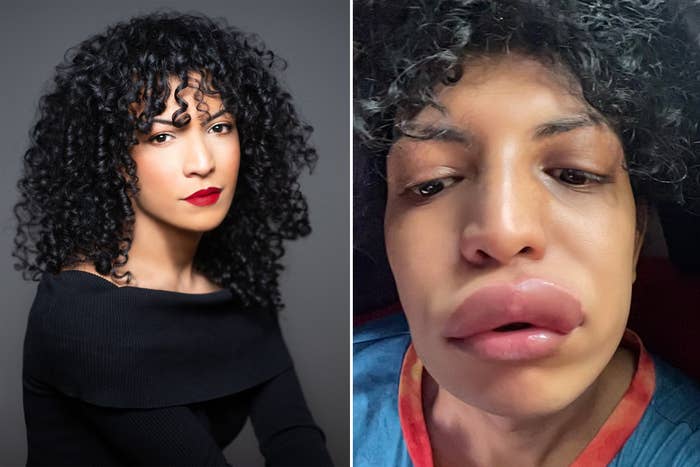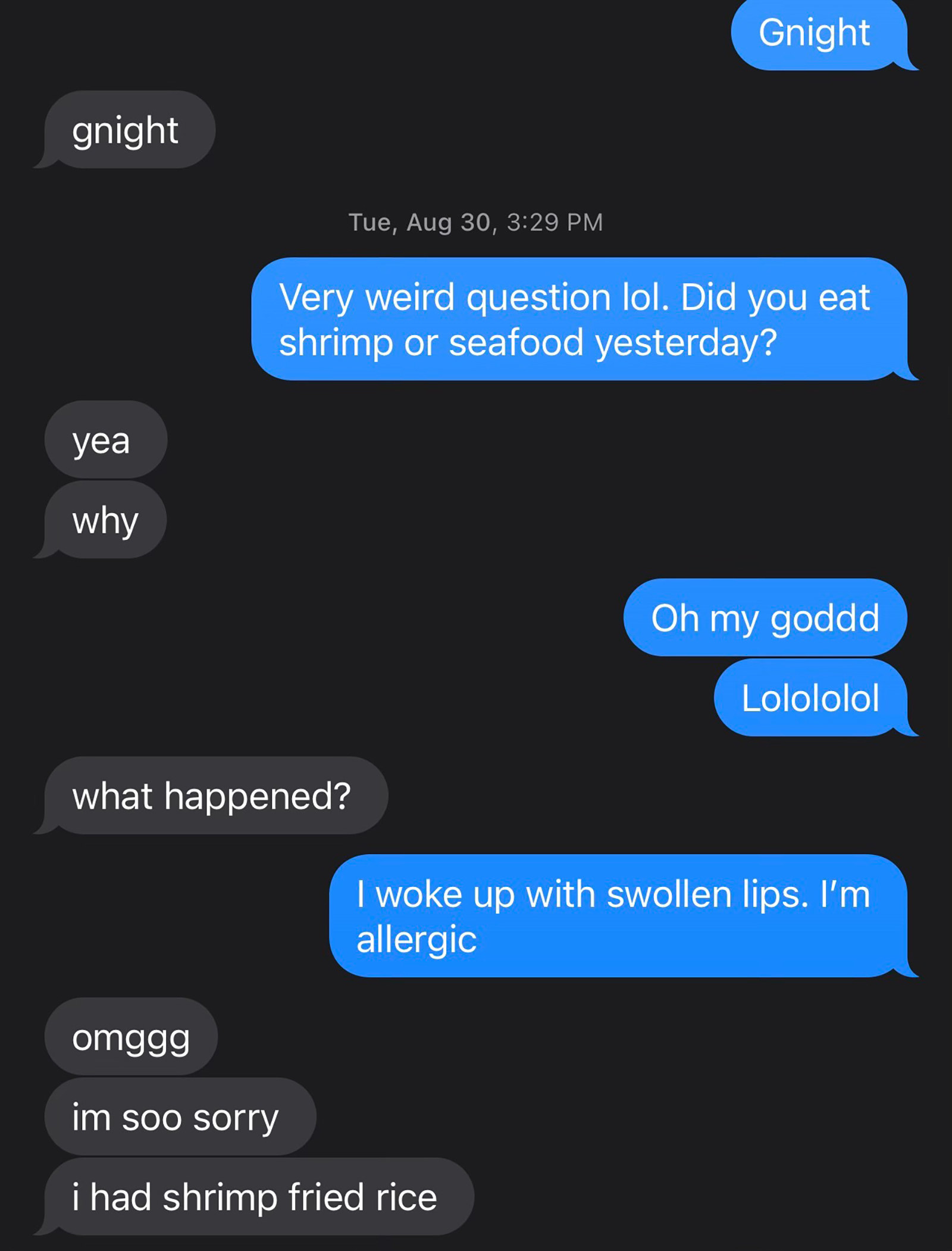
After saying goodbye to her date after a cozy night at home, 27-year-old Janelle Gonzalez noticed her lips and throat were beginning to itch while she was lying in bed. Nothing a Benadryl couldn’t fix, she thought, not thinking twice about what may have caused the reaction.
The next morning, however, Gonzalez woke up with an extremely swollen top lip — a kind of allergic reaction she typically only experiences if she eats shrimp.
“I started wracking my brain and the only thing I could come up with was this guy,” she told BuzzFeed News, adding that she did spend a bit of time in a makeout session with him.
A quick text conversation later, Gonzalez learned her date (who was very apologetic) had eaten shrimp fried rice several hours before meeting up. “I felt really awkward asking him because I was like, ‘Is this stupid? Does this even happen?’”
This kind of indirect exposure can in fact happen and trigger an allergic reaction, said Dr. Robert Sporter, a board-certified allergist. Food proteins can remain in someone’s mouth for a period of time after they eat; how long they hang out in there varies depending on several factors.
But this “thirdhand” exposure isn’t that common compared with more direct ones (like eating or touching the food yourself) and normally doesn’t cause major reactions like anaphylaxis, which is a potentially life-threatening allergic reaction that can cause difficulty breathing, nausea and vomiting, fainting, and swelling of the lips, throat, and face.
Common causes of allergic reactions include tree nuts, peanuts (which are legumes), eggs, milk, soy, or shellfish, as well as medicines like penicillin, or insect bites, cosmetic products, and latex.
Gonzalez, a makeup artist and photographer in New York City, said she’s “very grateful” her reaction didn’t warrant a trip to the hospital, which happened to her when she was 18 and had unknowingly eaten mushrooms stuffed with crab. In reality, the whole scenario was “hilarious,” she said.
She shared a video of her experience on TikTok (which she recorded several hours after waking up) that has amassed over 825,000 views, jokingly warning viewers to “watch your backs out there” because it’s “not even safe to make out with men anymore.” A peek at the comment section shows Gonzalez’s experience may be more common than previously thought.
“My friend’s sister kissed her fiancé the morning of their wedding after eating watermelon and he’s terribly allergic. They had to cancel the wedding,” one person wrote. “Kissing is exactly how we found out my husband is allergic to scallops,” another said.
Meanwhile, some parents figured they can take advantage of an otherwise unpredictable situation. “My parents made my bf in high-school eat peanut butter before our dates so we couldn't kiss…” someone else commented. (Given that anaphylaxis can be life-threatening, this seems like a really bad idea; don’t do this on purpose.)
Serious allergic reactions are possible with kissing
While Sporter doesn’t think intimately kissing someone who consumed a certain allergen is a “major source of dangerous reactions for most people,” serious reactions are definitely possible.
In fact, Gonzalez’s experience is informally known as the “kiss of death,” a term that became popular in 2005 after a 15-year-old girl in Canada with a peanut allergy was reported to have died after kissing her boyfriend after he ate peanut butter. However, the girl’s cause of death was debunked a year later, with the coroner citing an asthma attack as the true culprit.
Other case reports highlight similar events. In 2003, a 20-year-old woman almost died after kissing her boyfriend who ate shrimp less than one hour before; she began to experience lip and throat swelling, abdominal cramps, wheezing, nausea, hives, and low blood pressure less than one minute after the smooch. The woman worked in a seafood restaurant and regularly experienced mild reactions to the various dishes she served, so researchers speculated that these minor reactions over time may have “primed” her immune system to react strongly to the kiss.
In 2012, a 20-year-old died after kissing her boyfriend, who had just eaten a peanut butter sandwich.
And in 2021, a teen died the day after receiving fellatio from another teen who had eaten peanut butter before they met; the two never kissed, researchers said, and a condom was not worn, suggesting allergens can spread from mouth-to-skin contact. The researchers said “intimacy-related” allergic reactions are “exceedingly rare,” but they may be underreported because of social stigma, misdiagnosis, and lack of awareness.
Allergists recommend anyone with allergies, especially severe ones, to carry an epinephrine injector pen (like an EpiPen) and to wear an item like a MedicAlert bracelet that lists their medical information in the event a reaction occurs in public.
Why these kinds of allergic reactions happen and how to avoid them

Generally, a person does not react to a specific allergen the first time they’re exposed because their cells are not yet “sensitized” to it, Sporter said. Instead, their body responds by producing special antibodies called IgE.
The next time they’re exposed to the same allergen, these IgE antibodies become activated and trigger the immune system’s mast cells to dump histamine and other chemicals into the bloodstream, which makes them feel itchy, sneezy, etc., Sporter said. It’s a speedy process that usually occurs within seconds to minutes.
Taking antihistamines, like Benadryl, can help stop the reaction, although as we said, an epinephrine injection is needed for people with life-threatening reactions.
The most serious way to experience a reaction is to eat whatever you’re allergic to, but touching it can also elicit a response, like an itchy rash. This can happen directly, for example, if someone who is allergic to eggs touches egg yolk that dropped on the kitchen counter, or indirectly, when a parent who just ate peanut butter kisses their allergic toddler on the cheek.
Exposure to an airborne allergen, like when passengers open peanut packets in airplanes or when someone is boiling shellfish, is possible too. (Many airlines stopped serving peanuts during flights for this reason.)
“On the other hand, passionate kissing with exchange of saliva could be similar to actually eating the food,” Dr. Scott Sicherer, chief of the pediatrics allergy and immunology division at Mount Sinai, told BuzzFeed News in an email. “The consequences would depend on the amount of the allergen in the saliva of the person who ate the food, how much was transferred to the person with the allergy, and how sensitive the person with the allergy is to the allergen.”
Sicherer and colleagues conducted a study involving people without a peanut allergy and confirmed that peanut proteins were plentiful in those who ate a peanut butter sandwich, but the amount varied from person to person.
Turned out that brushing, rinsing, chewing gum, and simply waiting for over an hour after eating the peanut butter sandwich “resulted in there being little to no remaining peanut allergen in the saliva but it was not 100% gone for some,” Sicherer said. If people waited a few hours and then ate more food (without the allergen), the peanut protein was eliminated.
Experts recommend you discuss your allergies with your partner or anyone else who may be cooking for you or sharing your food, as well as anyone you plan to share saliva or other bodily fluids with. You also might as well clean your mouth as thoroughly as possible before kissing others because it could help.
It’s also never OK to intentionally consume or interact with your allergen just because you know you can take an antihistamine shortly before or afterward, Sporter said. Allergies come and go on their own terms, so it’s best to avoid known allergens altogether or visit a doctor to get the appropriate testing done.
As for Gonzalez, it took two full days for her lip to return to its normal size. The experience, she said, was “definitely eye-opening” and truly makes her wonder whether it’s a question worth asking before hooking up with new people.
“Like, is this a new thing on my list?” Gonzalez said. “‘Hey, are you STD-free, and also have you eaten shrimp?’”
